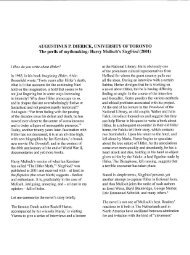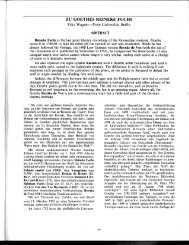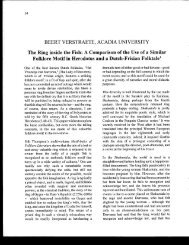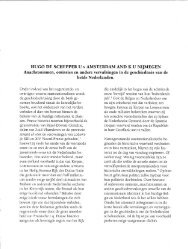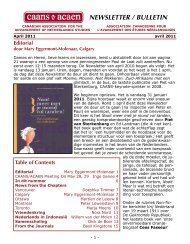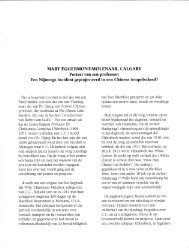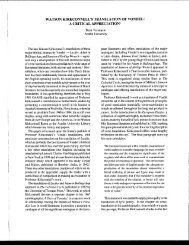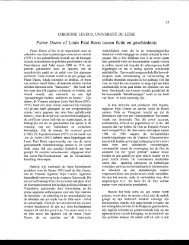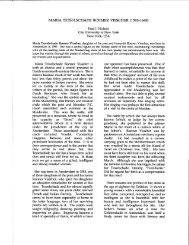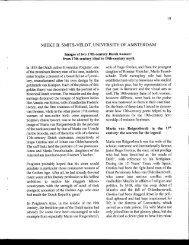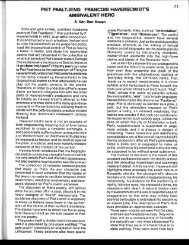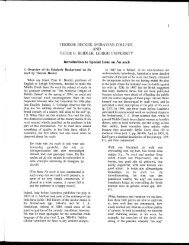BASIL D. KINGSTONE - Louis Couperus' "De binocle," - canadian ...
BASIL D. KINGSTONE - Louis Couperus' "De binocle," - canadian ...
BASIL D. KINGSTONE - Louis Couperus' "De binocle," - canadian ...
Create successful ePaper yourself
Turn your PDF publications into a flip-book with our unique Google optimized e-Paper software.
<strong>BASIL</strong> D. <strong>KINGSTONE</strong>, UNIVERSITY OF WINDSOR<br />
<strong>Couperus'</strong> "<strong>De</strong> <strong>binocle</strong>," its antecedents and its meaning<br />
Published in 1920, <strong>Louis</strong> <strong>Couperus'</strong> "<strong>De</strong><br />
<strong>binocle</strong>" (The binoculars) has become a<br />
standard choice for anthologies of Dutch short<br />
stories. However, considering the prominence<br />
that the story has attained, it does not seem to<br />
me that critics have given a convincing<br />
account of its sources or of its meaning.<br />
The plot is this. A young man visiting<br />
Dresden decides to see Wagner's Die<br />
Walkiire. However, his seat is at the front of<br />
the upper balcony, far from the stage, so he<br />
buys a pair of binoculars, although he feels he<br />
is being unwise and finds the optician<br />
uncanny. Soon after the performance begins<br />
he is seized with an insane desire to drop the<br />
binoculars on the bald head of a man in the<br />
orchestra stalls below him. At the first interval<br />
he regains control of himself somewhat, but<br />
he watches the rest of the performance from a<br />
safe position in the back of the balcony, and<br />
he leaves the glasses behind, feeling they are<br />
somehow accursed. Five years later,<br />
remembering almost nothing of the incident,<br />
he is again in Dresden, again Die Walkiire is<br />
being performed, and again the only seat<br />
available is at the front of the upper balcony -<br />
indeed, a vaguely familiar-looking man<br />
returns that ticket just in time for our hero to<br />
buy it. To cap it all, the usher rents him his<br />
own glasses. This time, screaming and as if<br />
out of control, he hurls them down into the<br />
orchestra seats; he happens to hit a man on the<br />
head, who yells and dies, "terwijl de hers ens<br />
spatten."<br />
Of the critics who have discussed the stories<br />
that may have inspired elements of "<strong>De</strong><br />
<strong>binocle</strong>," G. van Woudenberg l argues a<br />
similarity to a story by E.T.A. Hoffmann,<br />
"<strong>De</strong>r Sandmann." It is a far more complicated<br />
story, with a double and other diabolical<br />
goings-on, including a beautiful young singer<br />
who is in fact an automaton (yes, this is one of<br />
the three stories that Jacques Offenbach used<br />
in his operetta Tales of Hofftnann), but there<br />
are some parallels with <strong>Couperus'</strong>s story. The<br />
main character buys a telescope, and at the<br />
end he jumps off a tower, led to this fate by a<br />
series of uncanny apparent coincidences.<br />
W oudenberg considers also that both<br />
protagonists are modelled on their authors,<br />
and points out that in both stories some events<br />
recur (that is part of the uncanniness). And in<br />
both cases the last words of the story evoke<br />
splattering brains. Although Couperus never<br />
mentions reading Hoffmann, Woudenberg<br />
finds it plausible that he did, perhaps when<br />
visiting Dresden in 1898 (Hoffmann lived<br />
there for some years and was the conductor of<br />
1
But if this superbly ambiguous tale of the<br />
uncanny is not also an anti-Wagner tract, I<br />
think it does have an additional layer of<br />
meaning. (Readers of this article may<br />
perfectly well accept what I have said thus far<br />
yet regard what follows as a postscript with<br />
which they disagree). Let us consider the plot<br />
again. A weak-nerved young man resists the<br />
grave temptation to kill someone (for at some<br />
level he surely knows the binoculars will do<br />
that); but five years later the crisis recurs and<br />
he gives way, and a man "noodlottig<br />
getroffene" - that is, a random victim - dies in<br />
horrible violence. There can be no better<br />
image for the First World War. The very<br />
alliances formed to prevent it made it<br />
inevitable; and it was violent and horrible and<br />
destructive - 9 million soldiers dead and 22<br />
million wounded - beyond anyone's power to<br />
foresee. From the safe haven of neutrality the<br />
Dutch must have watched in disbelief and<br />
horror.<br />
The recurrence of the CrISIS was m fact<br />
multiple (one recurrence is enough for fiction,<br />
of course). On March 31st 1905, Kaiser<br />
Wilhelm II stepped off his yacht in Tangier<br />
and claimed German interests in Morocco,<br />
which France and Spain were in the process of<br />
carving up. A bold move designed to break up<br />
the alliances France was forming to contain<br />
Germany, it woke France up to the dangers of<br />
that policy; people began to feel they were not<br />
at peace, just in a prewar period. Other crises<br />
followed: Balkan wars in 1906-8 (some things<br />
never change), an incident involving deserters<br />
in Casablanca in 1908, another intervention in<br />
Morocco by Germany, who sent a gunboat to<br />
Agadir in 1911, more Balkan wars in 1912-13;<br />
and finally the decisive event in Sarajevo in<br />
1914. From all these warnings everyone<br />
seemed helpless to learn.<br />
<strong>Couperus'</strong> "<strong>De</strong> <strong>binocle</strong>," its antecedents and its meaning 5<br />
"<strong>De</strong> <strong>binocle</strong>" was published in 1920, but<br />
<strong>Couperus'</strong>s widow believed he wrote it in<br />
1898, "tijdens onze winter in Dresden". 13<br />
<strong>De</strong>pending on which date is correct, Couperus<br />
may have used immediate impressions of<br />
Dresden (and no doubt going to hear Wagner),<br />
or memories. T):1e date of composition, of<br />
course, affects/the precise interpretation. If<br />
/<br />
written in 1920, the story is a metaphorical<br />
reflection on the repeated crises that led to the<br />
unforese.en violent destruction and loss of life<br />
in the First World War. If it was written in<br />
1898, before all the political crises, it is a<br />
prophecy of war, to be ranked with Paul<br />
Valery's Une conquete methodique of 1897<br />
and other such non-fiction forecasts of the<br />
results of German expansionist policy, and<br />
more pertinently, with H. G. Wells's novel<br />
The Island of Dr. Moreau (published in 1896).<br />
This is the story where a mad scientist crosses<br />
humans and animals to produce highly<br />
intelligent beasts of prey. After the narrator<br />
has returned to Britain, he begins to feel that<br />
he has not left the dreadful island behind, for<br />
evolution is' reversing itself and all mankind<br />
will soon become as savage and dangerous as<br />
those animals:<br />
... for several years now, a<br />
restless fear has dwelt in my<br />
mind, that [human beings]<br />
would presently begin to<br />
revert... I see faces keen and<br />
bright, others dull or<br />
dangerous, others unsteady,<br />
insincere; none that have the<br />
calm authority of a reasonable<br />
soul. I feel as' though the<br />
animal was surging up through<br />
them; [I fear] that presently the<br />
degradation of the Islanders<br />
will be played over again on a<br />
larger scale. 14
have internalised it, or else was prepared to<br />
play up to it in his readers.<br />
10 Cf. Claude Digeon: La crise allemande de<br />
la pensee fran9aise, Paris: Presses<br />
universitaires de France, 1959, p.453-4.<br />
II Eep Francken: '" As the brains splattered:' J.<br />
Fontijn's psychological interpretation of 'The<br />
Binoculars' by <strong>Louis</strong> Couperus," Dutch<br />
Crossing 47 (Summer 1992) p.87-94.<br />
<strong>Couperus'</strong> "<strong>De</strong> <strong>binocle</strong>," its antecedents and its meaning 7<br />
12 Ibid. p.91 and n.8.<br />
\3 Ibid. n.9 and 10.<br />
14H.G. Wells: The Island of Dr. Moreau<br />
(1896), ed. Leon Stover, Jefferson, NC:<br />
McFarland, 1996 (The Annotated H.G. Wells,<br />
/<br />
2),206-7. /<br />
/<br />
15 Francken p.92.



